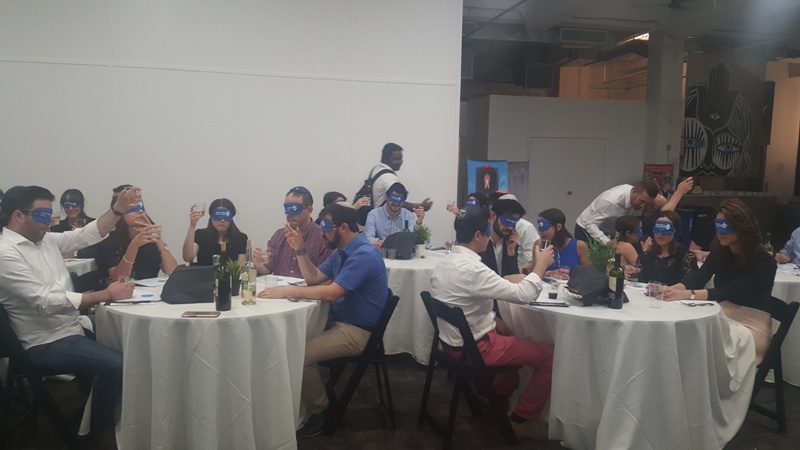‘Access Israel’ held “A Meal of the Senses” in New York City. Two New Yorkers find a way to introduce unobservant Jews to a ritual of respite.
By Daniella J. Greenbaum / The wall street journal
Shai Schmidt no longer counts the Shabbat dinner as part of his typical Friday night. Yet having grown up as part of a traditional family in Jerusalem, the rituals are familiar: warm challah bread, cold wine, hot chicken soup, spirited songs. Although Mr. Schmidt is no longer religiously observant, he often finds himself missing the experience. It can be hard to replicate.
The Shabbat dinner marks the ceremonial start of the Jewish Sabbath, which runs from Friday evening to Saturday night. Observant Jews spend the 25 hours abstaining from working, handling money, driving, writing and much more. In a world where cellphones and other devices essentially function as bodily appendages, the Sabbath offers respite from the noise. Rather than seeing the rules as restrictions, many think of them as a source of liberation, providing time to stop and think without constant interruption.
For Jews like Mr. Schmidt—respectful of tradition but personally unobservant—there are relatively few substitutes. But Aaron Kaplowitz and Shimon Shmooely hope to change that with a series of dinners called “+1” that they have begun hosting in New York.
For the first dinner on March 10, the two 30-somethings invited 18 guests from across the religious, professional and social spectra. These 18 were then asked to invite someone to the next dinner. The pattern will repeat each time, culminating in a fifth and final dinner
for 288 attendees later this year. Each of the dinners includes Shabbat staples like challah and wine, but they also have interesting programming.
At the first one, billionaire philanthropist Lynn Schusterman, whose foundation provided funds for the first two dinners, spoke about her focus on Jewish continuity and pluralism.
The Israeli musician Yoni Bloch described how he went from a rock star to technology entrepreneur. At the second dinner, Ambassador Dani Dayan, Israel’s consul general in New York, fielded questions about his personal political views and the current policies of the government in Jerusalem.


At the most recent dinner, three Israelis with different disabilities talked about the challenges they face navigating daily life. Attendees were then given a small sliver of their experience by being impaired throughout the meal.
I was blindfolded for the first course, unable to see who at my table was harmonizing as we sang “Shalom Aleichem,” the song that formally begins the Shabbat meal. For the main course, I was given gloves that made it unthinkably difficult to use utensils, pick up a glass, or wield a napkin. (Mercifully, my dress somehow remained unstained.) During dessert, I wore specially made headphones that made it impossible to hear fellow diners. This was not my Bubbe’s Shabbat table.


Messrs. Kaplowitz and Shmooely hope others replicate their experiment. They want to expand the way people experience the Sabbath—along with who experiences it. For me, Shabbat is a weekly tradition, but it had been far less familiar to many of the dinner attendees. One attendee, who works in New York real estate, told me that growing up in the Soviet Union, his family never had Shabbat dinners. It wasn’t until he came to the U.S. in the mid-1990s that he first experienced the ritual so commonplace to American Jews. Mr. Schmidt, one of the original attendees, brought along two secular friends to the subsequent dinners.The early Zionist thinker known as Ahad Ha’am—whose Hebrew nom de plume translates to “one of the people”—wrote in an 1898 essay: “More than the Jews have kept the Sabbath, the Sabbath has kept the Jews.” Observing the laws of the Sabbath as a modern Orthodox Jew has molded and solidified my own religious beliefs. It has kept me, one could say. Most American Jews aren’t Orthodox, but even without strict observance, the experience of Sabbath can keep them too.
For some, perhaps, the Sabbath calls to mind an archaic institution characterized by tedious traditions. But the minute details of observing the Sabbath are far less significant than the idea of the day itself. It’s easy to think of religion in its traditional glory as the enemy of modernity, but these recent dinners prove something else: that it’s possible to be faithful to the customs of the past while recognizing that an evolving culture ensures new meaning will be found in old rituals.Ms. Greenbaum is an assistant editor at Commentary magazine.











